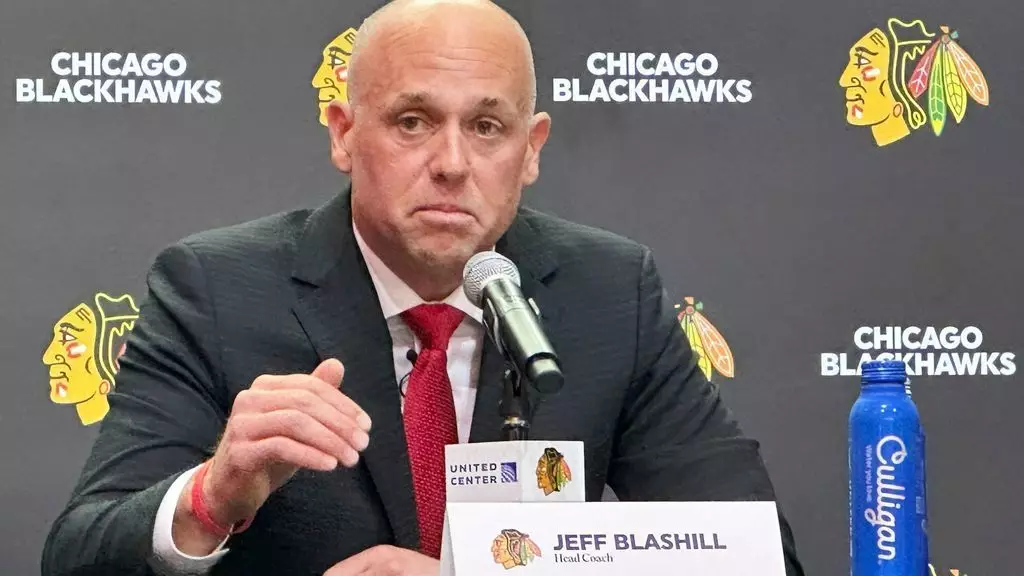The Chicago Blackhawks find themselves at a pivotal crossroads, facing the arduous task of rebuilding a franchise that has seen better days. Under the fresh leadership of head coach Jeff Blashill, this transformation is not just about developing skills but reshaping the very culture of the team. The opening days of training camp have laid bare a relentless focus on discipline, fundamentals, and a clear vision for a future where youthful talent like Connor Bedard can flourish. It is a bold strategy—embracing discomfort and pushing hard from the outset—to foster resilience and instill a winning mentality.
Blashill’s approach signifies a departure from complacency. The grind that players endured on the first day signals a commitment to establishing high standards, even if it leaves some momentarily exhausted and sore. This is a coach driven by the belief that sustained success stems from rigorous preparation. As a fresh face with NHL coaching experience, Blashill aims to anchor his team with a solid foundation of culture—one rooted in accountability and the relentless pursuit of excellence. For the young Blackhawks, these early efforts are more than mere drills; they are the seeds of a resilient identity that can uplift a franchise in transition.
The Challenge of Cultivating Identity in Youthful Lines
The Blackhawks’ roster is notably young, a roster that presents enormous potential yet also substantial growing pains. Bedard, at just 20 years old, is heralded as a cornerstone of the franchise’s future, but relying on youth alone is insufficient. Blashill’s mission is to harness this raw talent into a cohesive, disciplined, and competitive unit. The team’s transition from a team that has struggled to stay competitive in recent seasons hinges on systemic improvement and the creation of a unifying ethos.
While the players understand the intensity of Blashill’s approach—acknowledged by captain Nick Foligno—the real test will be translating this initial push into consistent performance during the long NHL season. Building a culture isn’t an overnight process; it requires perseverance and unwavering leadership. Blashill’s focus on fundamentals shows his belief that success is rooted in doing the small things well, which can elevate a team, especially one filled with young, ambitious players eager to establish their identities.
A Cautiously Optimistic Outlook Amid Uncertainty
The Blackhawks face a significant obstacle in their goaltending situation, with key figure Laurent Brossoit sidelined long-term due to injury. This lacuna isn’t just a minor setback; it underscores the larger challenge of assembling a balanced roster capable of competing at the highest level. However, the team’s acquisition of Spencer Knight and the development of Arvid Soderblom reflect a strategic move toward building a resilient defensive backbone. This signifies a proactive mindset—anticipating problems and addressing them through calculated moves.
Blashill’s previous tenure with the Detroit Red Wings and assistant role with Tampa Bay provide him with valuable insights into navigating team-building and player development under pressure. His acknowledgment of parallels between coaching in the minors and the NHL highlights his understanding of patience, persistence, and incremental progress. The sooner the Blackhawks can adapt to this demanding mentality, the sooner they can forge a new identity rooted in grit, discipline, and unshakeable confidence.
The Path Forward: Cultivating Resilience and Expecting Growth
For the Blackhawks, this season represents more than just wins and losses; it is an experiment in rebirth. The early days of training camp wallow in sweat, intensity, and a relentless pursuit of skill—signs of a team determined to rewrite their story. Blashill’s unwavering focus on culture, systems, and positional clarity signals a long-term vision that hopes to elevate the team from a group of promising individuals to a cohesive, resilient unit capable of challenging stronger opponents.
There is palpable optimism amid the adversity. The youthful roster, with Bedard at the forefront, has the potential to surprise critics who see only the black-and-blue challenge ahead. Blashill’s leadership, combining his NHL experience and his hard-earned lessons from the minors, positions him as a coach who can cultivate talent while fostering mental toughness. If the Blackhawks can embrace this demanding start and continue to build on their foundational principles, their future may soon shine brighter than the recent clouds of disappointment.

